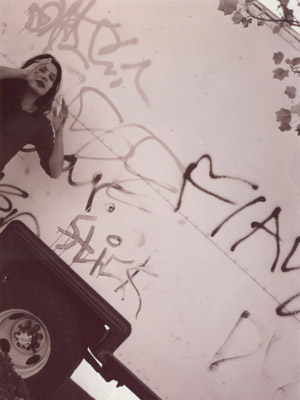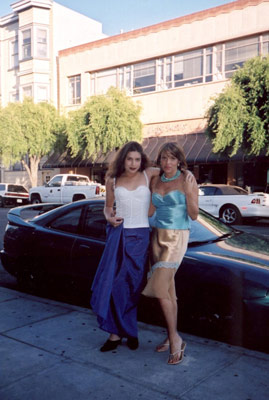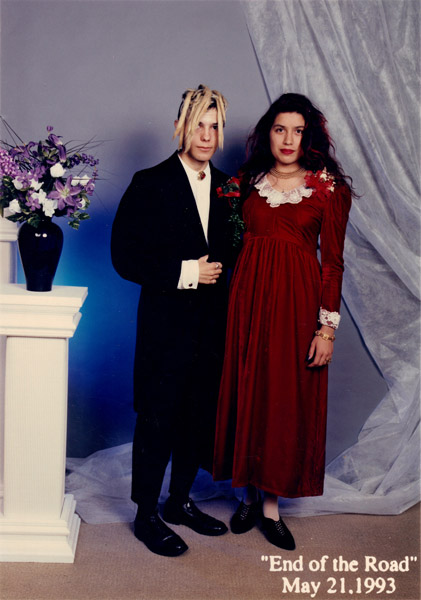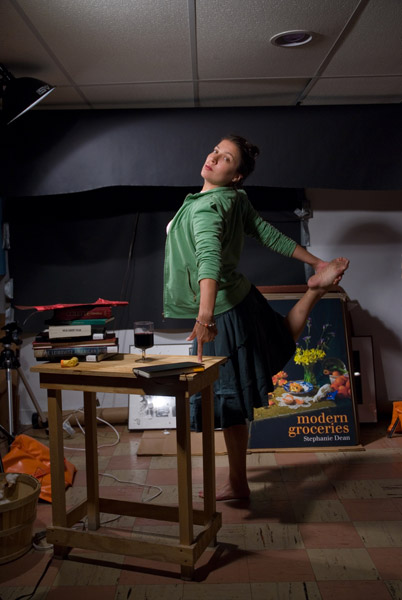Essay
Facing Reality: Funerary Photographs for the Vain or Self-Conscious
By Stephanie Dean
"The face is our most potent symbol of personality... That subtle element of the ludicrous inherent in facial transformation in time, is the signpost of discouragement pointing along the path of evolution of personality. For to what end is our experience of life, if deprived of a fitting aesthetic revelation of our faces?"
— From "Auto Facial Construction" by Mina Loy, date unknown, either 1919 or 1906.1

This would not be a good photo to use because it makes the author look like she is proud of some graffitti she just put on the truck, or she is part of a gang.

The author doesn't know who took the photo. This would not be a good photo to use because the author was dressed in what has often been deemed "lingerie." However, this is one of the author's favorite photos due to her slenderness, red lipstick and the fact that she is with one of her most beloved girlfriends.
What photograph would you use to represent yourself in your obituary? At your wake? Or on your headstone? It is likely that the idea that after you pass on, there will be a moment, or a collection of moments, when people who you knew and loved, will choose the photographs of you which will be shown at an event held in recognition of your death. Reserving a specific photograph or photographs for a memorial, funeral, wake, newspaper obituary, or any other mode of deploying the fact of your death and what you looked like, is unlikely to occur to most people. As photographers or connoisseurs of photography, (dear reader of f-stop) the possibility of what photo or photos will be used at our own funeral is more likely to have occurred to us. Most people have made numerous self-portraits in an aim to determine, define or describe themselves. And many of us as photographers have made professional headshots, for our clients.
Throughout their lives some people use the same headshot for everything, regardless of their age. If you have visited Chicago, particularly either of its two airports, between 1989 and 2011, you probably witnessed the never-aging photographs of Mayor Richard M. Daley welcoming you personally to Chicago. Headshots are infamously grudgingly updated. Either because they are expensive, or for the mere fact that the sitter has aged since the approved head shot was taken. For people with less of a public profile, a family favorite-snapshot, military portrait, class photograph or other "formal" photograph might be similarly employed. The author dares anyone that possesses ten years between this moment in time and the moment their senior prom photo was taken, to ponder the concept that that prom photo will be the lasting image which, someone other than yourself would choose to be your face for posterity. Are you appalled at this idea?

This would not be a good photo to use due to it's age and the fact that one person is leaning one way, the other the opposite way. In addition, it's a prom photo - it's duty is to be made fun of.
The time has come for every person who has ever made a self-portrait and posted it on Facebook or circulated it in a public forum, to consider their facial photo legacy and to designate and update, as one plans with personal last wills and testaments, the photograph or photographs to be used to represent their visage in the case of their death. Consider also that these photos may be presently or permanently hidden in memory cards, prints, negatives or film. If you do not designate which photos you have sanctioned, after your death, nothing of yours is off limits. Everything is available: you are not there to protect your things. Only your legal counsel, best friends and a solid safe may be there to secure your image. Anything you ever thought you kept hidden may be found by someone and used for purposes you explicitly hid those photos from. Someone may end up choosing your prom photo or some other image of your great personal dislike and dread. Consider this as you permit the most ubiquitous of all mediums to determine how your face is remembered posthumously, and that your mortality will need to be summed by three determining factors: photography's ability to render a photograph you desire to represent you, your ability to have had someone create that photograph and thus obtain it, and finally how you equip your loved ones with the information and tools to memorialize your visage properly.

While the author loves this photo and considers it a triumph in her oeuvre of self portraiture, she would not like everyone to remember her showing a dirty foot, in a strange pose, and without makeup. The author would prefer to have her final photograph depict her with, at the very least, her signature red lipstick.
This is not a suggestion for readers to run out and get head shots made, or even formal portraits, nor funerary portraits. This is a request for the reader to consider their photographic legacy, especially for the moment of the announcement of your demise. A suggestion here would be to choose your photographs and to have them ready in a variety of easily accessible media and file formats. Dr. Adam A. Smith pointed out that we should not assume that everyone will have access to Photoshop, so a ".psd" file would be a cumbersome and bad choice. He suggested formats such as a high resolution ".jpg" or ".tiff" file which are most common. Dr. Smith was consulted because he holds a PhD in computer science and his insightful opinion matters on this next point. Depending upon when you die, if you don't update your photos to the latest common photographic file formats, your heirs may need to rely on the nerds of the future and their legacy systems to extract the required photographic data from digital formats (and even slides, 35mm and old VHS tapes). That could potentially be pricey, time consuming, or logistically impossible, and might be accompanied by a reduction in quality. Imagine your heirs having to "settle" for scanning that old framed analog photographic print of you....whatever image that may be! Dr. Smith also suggests that the file format be open source- and, again, standard.
1 Loy, Mina. The Lost Lunar Baedeker, Poems. Selected and edited by Roger L. Conover. New York: Farar Strauss Giroux. Pg. 165.
Dear Readers: For those of you who know me from my last work on F-stop ("Smile!" A Polemic on Fine Art Portrait Photography) here is an update on my October article: the research (via survey monkey at: https://www.surveymonkey.com/s/8V2WY57 ) is still being gathered. This is because the sample size is too small to calculate with any reliability. My sample size (N=50) as of 1-25-12, is half of what I'd like it to be. I will wait until the sample size of the data reaches 100 to analyze it. For this reason, it will remain open, and I'd appreciate it if photographers would circulate it across the globe. I will also email all participants who have thankfully included their emails with their responses, and anyone that has personally contacted me regarding that article. I hope to have that data analyzed and reported within the next six months. Thanks for your kind patience and participation.
Thanks to Dr. Adam A Smith for his kind contribution of expertise.
Thanks to my proofreaders: Lyle Sande and Chris Schedel
Thanks to Matthew Chalker for an "Ah ha" moment from his thesis.
